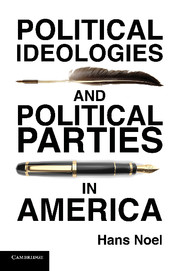Book contents
7 - Ideological Parties and Polarization
Published online by Cambridge University Press: 05 June 2014
Summary
The watchword for U.S. politics since about 2000 has been “polarization.” Much has been said, both fruitful and misleading, about the conflict between “red America” and “blue America,” and the increasingly polarized politics in the United States. A richer understanding of the nature and role of ideology puts polarization in perspective. This chapter clarifies the implications of a theory of ideology for polarization. In short, because the coalitions defined by political parties are now reinforced by ideology, we will see what we might call polarization. Moreover, it is intellectuals who are most polarized. If intellectuals shape party coalitions, then their polarization may be a driving force behind party polarization.
The first section of this chapter outlines several ways of conceptualizing polarization. The second demonstrates that intellectuals have become increasingly polarized over the period for which we have data. In the third section, I discuss how ideology and party can reinforce each other when they prescribe the same coalitions.
The Meaning of Polarization
Scholars and the popular press have used polarization to mean at least four different things (see DiMaggio et al. 1996 for a good discussion). Polarization might mean that the opinions of voters or members of Congress (or whomever) have become more dispersed. It might mean that the distribution of these opinions has become bimodal. It might mean more issue constraint, in Converse ’s terms. And it might mean that different groups are now further apart on issues. The main claim of the polarization thesis is simply that the ideological difference between “us” and “them” is somehow more significant than it once was, and all of these concepts are consistent with that vague definition.
- Type
- Chapter
- Information
- Political Ideologies and Political Parties in America , pp. 165 - 180Publisher: Cambridge University PressPrint publication year: 2014



